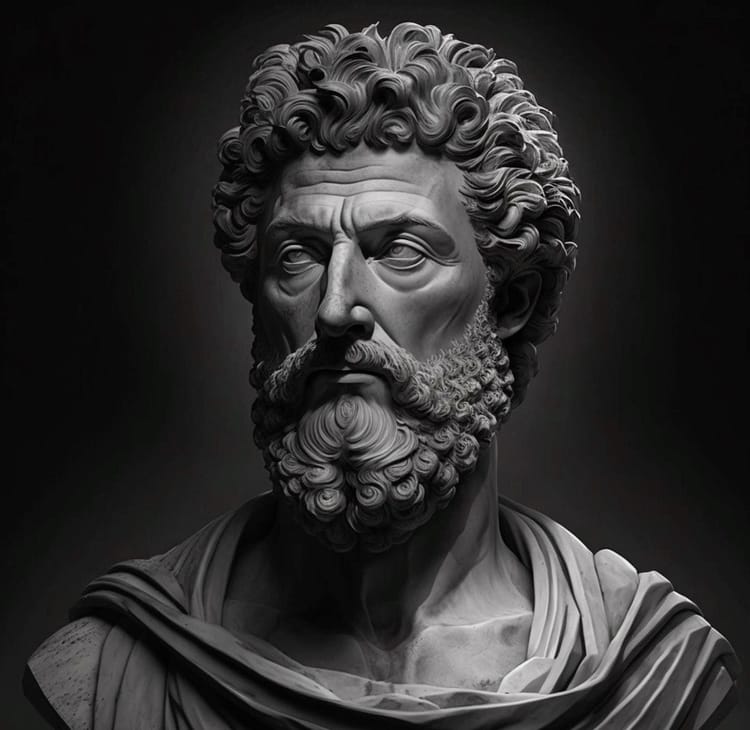Seneca: The Sage of Stoicism.

"We suffer more in imagination than in reality."
Lucius Annaeus Seneca, born around 4 BCE in Corduba, Hispania, is renowned not only as one of the great Stoic philosophers of ancient Rome but also as a statesman, playwright, and advisor to Emperor Nero. His writings, particularly on Stoicism, continue to influence modern thought, offering timeless wisdom on virtue, emotional resilience, and living a meaningful life. Understanding Seneca's life and applying his Stoic principles to our daily routines can help foster inner peace and a purposeful existence.
Early life and political involvement
Seneca was born into an elite Roman family, and his father, Seneca the Elder, was a well-known orator and writer. His early life was marked by a rigorous education in rhetoric and philosophy, which laid the foundation for his Stoic beliefs. Despite suffering from chronic illnesses, he became an influential figure in Roman politics, ultimately serving as an advisor to Emperor Nero.
Seneca's political life, however, was fraught with challenges. Though he initially tempered Nero’s excesses, over time, he became disillusioned with the emperor’s increasingly tyrannical behavior. In 65 CE, Seneca was implicated in a conspiracy against Nero and was ordered to commit suicide, which he did with the same Stoic calmness that defined much of his writing.
Core Philosophical Teachings
Seneca’s writings provide a comprehensive guide to Stoic philosophy. At the heart of his teachings lies the belief that our thoughts and actions, not external circumstances, determine our happiness and tranquility. His works stress the importance of inner virtue, self-discipline, and rationality.
- Letters to Lucilius: In these letters, Seneca addresses his friend Lucilius on a variety of topics—death, wealth, anger, and the pursuit of wisdom. The letters serve as practical guides to navigating life’s challenges with Stoic resilience, urging readers to live by virtues such as courage, justice, and wisdom.
- On the Shortness of Life: One of Seneca's most enduring works, this essay contemplates the finite nature of life. Seneca argues that people squander much of their time on trivial pursuits, and the key to a fulfilling life is focusing on what truly matters: personal growth, meaningful relationships, and self-mastery.
- On Anger: Seneca's treatise on anger outlines how this destructive emotion arises from unrealistic expectations and suggests that we can control it by examining our thoughts and perceptions. His advice is remarkably modern, encouraging emotional intelligence and mindfulness as antidotes to anger.
- On the Tranquility of Mind: Here, Seneca explains that tranquility—or inner peace—comes from aligning one's life with reason and virtue. Instead of being swayed by external events, individuals should focus on cultivating a calm and resilient mind. Seneca’s approach to managing stress, anxiety, and frustration is as relevant today as it was in ancient Rome.
Applying Seneca's Teachings to Modern Life
Seneca's philosophy offers profound lessons for navigating the complexities of modern life. Here are a few practical ways to apply his Stoic wisdom:
- Master Your Time: In “On the Shortness of Life,” Seneca emphasizes the value of time as our most precious resource. In a world filled with distractions—endless social media, emails, and entertainment—his advice on time management is more crucial than ever. Seneca urges us to focus on what truly matters and avoid wasting time on superficial or unimportant matters. You can start by setting clear priorities, practicing mindfulness, and ensuring that your actions align with your long-term goals.
- Control Your Reactions: One of the cornerstones of Seneca's Stoicism is the idea that we cannot control what happens to us, but we can control how we respond. Whether it's a frustrating situation at work or a personal setback, Seneca advises us to remain rational and not allow negative emotions to cloud our judgment. In an age of instant gratification and heightened stress, practicing this form of emotional control can help us lead more peaceful and fulfilling lives.
- Cultivate Emotional Resilience: Seneca’s essays on anger and grief offer practical strategies for managing difficult emotions. By acknowledging the inevitability of setbacks and reframing how we interpret events, we can build emotional resilience. Seneca teaches that by expecting challenges and maintaining perspective, we can respond with calmness and wisdom, rather than succumbing to frustration or despair.
- Seek Meaning Beyond Material Wealth: Seneca himself was wealthy, yet he constantly stressed that external riches do not bring true happiness. In today’s consumer-driven society, Seneca's insights on the limits of material wealth can serve as a counterbalance to the relentless pursuit of more. Instead of chasing external validation, he advises focusing on cultivating internal virtues such as kindness, patience, and generosity. These are the qualities that lead to lasting fulfillment.
- Face Mortality with Courage: One of the most challenging Stoic ideas is the acceptance of death. Seneca believed that by contemplating death regularly, we can free ourselves from the fear of it and live more fully. In modern life, where death is often a taboo subject, confronting our mortality can help us appreciate the present moment and live with greater purpose.
Legacy and Influence
Seneca’s influence has endured for centuries, shaping the Stoic revival during the Renaissance and continuing to guide modern thinkers and practitioners of Stoicism. His writings are a treasure trove of practical wisdom, offering readers a roadmap for leading a virtuous and resilient life. By applying his teachings, we can navigate the uncertainties of modern life with grace, strength, and purpose.
Whether it's mastering time, managing emotions, or finding meaning beyond material success, Seneca's philosophy remains as relevant today as it was two millennia ago. His life, marked by intellectual rigor, personal challenges, and a deep commitment to virtue, serves as an example of how to live with wisdom and integrity in any age.
Key Sources:
- Seneca’s own works, such as Letters to Lucilius and On the Shortness of Life
- Modern interpretations from The Daily Stoic and Stanford Encyclopedia of Philosophy. [Stoic Camp] [Encyclopedia.com].




